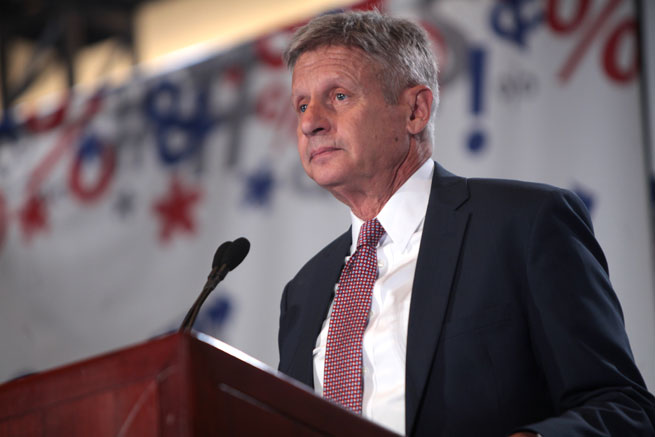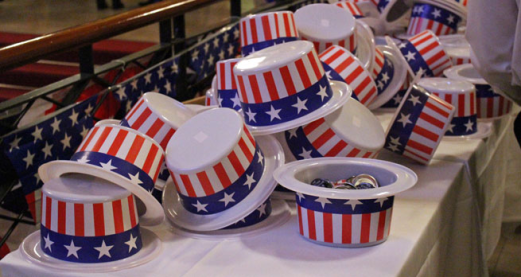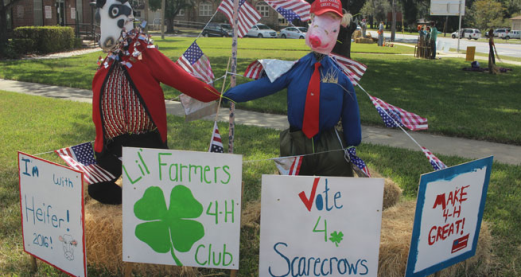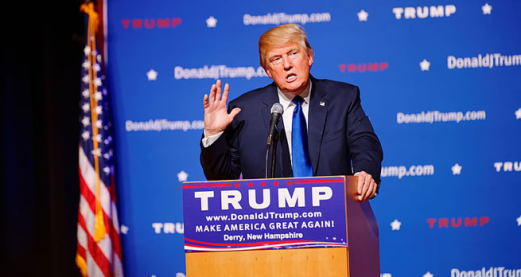 Gary Johnson
Gary Johnson
It's traditional for candidates to receive a 'bounce' in their poll ratings after their Conventions. The American Presidency Project - based at the University of California, Santa Barbara - is citing reports giving Donald Trump an average of a +3% poll rating following his Convention. That's a positive, and better than Mitt Romney managed in the 2012 cycle (he actually managed to shave a point off his ratings) but it's on the low side. True, George W Bush only got a 2% uplift when he was seeking re-election, but no Republican who wasn't an incumbent has had such a small bounce and gone on to win the White House. (Obviously, the caveat that this is a comparison rather than a law of science applies.)
The figures aren't in for Clinton yet, but she'll do well to remember that President Carter got a 10 point bounce before facing off Ronald Reagan in 1980, and - even with the power of incumbency - managed to lose.
See the full table for the convention bounce at the American Presidency project
Now we've had a chance to look more closely at the candidates, what is the world making of them?
Writing in the New Yorker, Pankaj Mishra suggests that Donald Trump is fulfilling a prediction made by Rousseau:
Rousseau’s rejoinders to cosmopolitan commercialism have constituted the basic stock-in-trade of cultural and economic nationalists worldwide. Poland’s ruling Law and Justice Party, which is busy purging pro-E.U. “liberal élites” from national institutions and mainstreaming homophobia and anti-Semitism, would be thrilled by Rousseau’s warnings about the “cosmopolitans who go on distant bookish quests for the duties which they disdain to fulfill in their own surroundings.” Pitilessly ostracizing Mexicans and Muslims, Donald Trump may find much philosophical backup in “Émile; or, On Education.” “Every patriot is severe with strangers,” Rousseau wrote. “They are nothing in his eyes.” Trump, in his tussle with Megyn Kelly of Fox News, and with womankind in general, might also draw comfort from Rousseau’s view of “woman” as “specially made to please man,” who “must make herself agreeable to man rather than provoke him.”
Many such proclamations of varying harshness helped to create the commonplace perception of Rousseau as the spiritual godfather of Fascism. But there is much more evidence that he extolled the collective only insofar as it was compatible with the inner freedom of its members—freedom of the heart. As he wrote in “Reveries,” “I had never thought the liberty of man consists in doing what he wishes, but rather in not doing that which he does not wish.” This basic distrust of external constraints on individual autonomy naturally slid into a suspicion of the great and opaque forces of international trade—the crucial difference, according to István Hont, between Rousseau and Adam Smith.
Read at The New Yorker: How Rousseau predicted Trump
Part of Trump's pitch for the White House is based on his business skills, and his ability to negotiate a tough deal. Don Moore, from the UC BerkleyHaas School Of Business, isn't sure that the man matches the myth:
Even on the campaign trail, we have seen obvious negotiation failures. By one estimate, the Trump campaign paid three times what the Sanders campaign did to run commercials during the same time slots on the same stations. Meanwhile, he has undermined numerous other deals. Both NBC and Univisiondeclined to air Trump’s Miss USA pageant last year after he disparaged Mexican immigrants. Companies in the Arab world have severed ties with Trump after his comments about Muslims. At home, the list of U.S. companies that are severing ties with the Republican National Convention is getting longer.
Some might defend his impolitic behavior by arguing that he was astutely sacrificing profit in order to win votes, but that argument falls flat. Trump started offending people and losing deals well before he began his campaign for president. Consider what was supposed to have been his most important deal: developing Manhattan’s West Side Yards, then the largest undeveloped property in New York City. The negotiations with public, private, and regulatory stakeholders devolved into a public exchange of insults between Trump and then-New York Mayor Ed Koch. Trump was ultimately forced to sell to a group of Chinese financiers in a deal the New York Times described as “perhaps the closest that Mr. Trump has come to international diplomacy.” But the negotiation left Trump so angry at his Chinese partners, he later sued for $1 billion. The court ruled against him.
Read at Berkley Blog: Trump says he’s a great negotiator, but the evidence says otherwise
How to succeed at negotiations: a psychological take
If Trump has upset Chinese investors, what are the Chinese more broadly making of the campaign - and in particular, a female candidate for President? David Dollar and Wei Wang of The Brookings Institution have researched the Chinese reaction to Hillary Clinton:
A reader comment on a Peng Pai News report on the investigation into Clinton’s use of private email server reads, perhaps characteristically: “She is so old. Why can’t she go home and help raise children?” It is widely believed in China that women over 55 (the legal retirement age for women there) should stay home and help babysit their grandkids. So for Clinton to now run for president of the free world is off-putting to many Chinese.
But there is another, more favorable view of Clinton in some Chinese circles. She has won an increasing number of admirers—mostly women, feminists, liberal intellectuals, and social libertarians—for her achievements as a woman. On the official Weibo account of the Sanlian Life Weekly magazine—which tends to have a more liberal readership—an article describing Clinton’s impressive political career generated a lot of positive attention. Commenters expressed fondness and respect for her as someone who shows “extraordinary courage and perseverance.” One comment reads: “I admire her courage to pursue her dreams at this age”; another reads: “She is my role model as a woman. [We should all] struggle for a noble ideal regardless of our gender, nationality, and personal difficulties.”
Read at Brookings: What Chinese people think about Hillary Clinton
The Chinese might be warming to the idea of a President Clinton, but not everyone in what should be her strongest States at home are convinced. The bruising battle with Bernie Sanders - and the revelation of Democratic Party attempts to frustrate Sanders - has taken a toll. Middlebury College's Matthew Dickinson found Clinton might have trouble converting Sanders' staunchest supporters into voters. He was at a volunteer fire-fighter's picnic in Vermont:
More generally, almost everyone I talked to described Hillary as a deeply flawed candidate, one who simply did not excite them. More worrisome, they seemed to believe that Trump was going to win in November. None of them expressed any willingness to vote for Trump, but all had stories of fellow Bernie supporters who were now pledging to do just that. On the whole, it was a very dispirited bunch – not exactly a promising sign two days after the convention held to unify the Party!
To be sure, one needs to be careful about generalizing to all Bernie supporters based on a very small and unrepresentative sampling at a local fire department. But I have learned the hard way that what I read on my twitter feed, and hear on the cable shows, is not very likely to tell me much about how rank-and-file voters are thinking – something I discovered when I belatedly caught on to the Trump phenomenon only after attending his rallies. Moreover, my non-random sample is consistent with the results of a recent state-wide poll that found, when given a choice between Clinton, Trump or Gary Johnson, only 53% of Bernie supporters say they will support Clinton.
Read at Presidential Power: In Sanders' Country, Berned supporters not yet ready to back Clinton
Read: What did Bernie Sanders' campaign achieve?
Ah, yes. Gary Johnson - who graces the top of our page. He's the leading third-party candidate this year. There are around 32 third-party and independent candidates who are seeking election to the White House; Johnson, who is the pick of the Libertarian Party, is the only one who is currently visible in polling numbers. Third party candidates have a hard enough time of taking on the dominant two machines, and to be honest this bit of The Simpsons didn't exactly help, either:
But Raw Story explains that Johnson could, at least theoretically, be more than just a minor disruptor in the election:
Note that the [potential wins] adds up to 8 potential states that could support Johnson by plurality, with six being Mountain West states (including Alaska) and two being New England states. Their electoral vote adds up to 32, enough to decide which of the other candidates win the election, or enough to prevent either Donald Trump or Hillary Clinton from winning an outright victory on November 8. They are all small populated rural states, but they could be the balancing act, and decide who will be President.
And in theory, if neither major party candidate wins 270 electoral votes, the election would be thrown to the House of Representatives for the first time since 1824. In a Republican controlled House, Gary Johnson, in theory, could be elected President with the lowest percentage of popular votes in American history, far less than John Quincy Adams’ 30.9 percent in 1824 or Abraham Lincoln’s 39.8 percent of the vote in 1860.




Rate and Review
Rate this article
Review this article
Log into OpenLearn to leave reviews and join in the conversation.
Article reviews